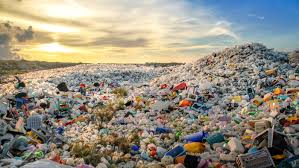
Photo Credit: File Photo
Plastic pollution has emerged as one of the most pressing environmental challenges of our time, casting a shadow over ecosystems, wildlife, and human health worldwide. Over 8 million tons of plastic waste enter the world's oceans every year, wreaking havoc on marine life and coastal communities. This staggering statistic paints a grim picture of the scale of the problem and underscores the urgent need for action to address plastic pollution.
Plastic pollution poses a myriad of threats to marine ecosystems and biodiversity. Discarded plastic items, from single-use bottles to fishing gear, entangle marine animals such as seabirds, turtles, and whales, often leading to injury, suffocation, or death.Additionally, marine species ingest plastic debris, mistaking it for food, which can cause internal injuries, blockages, and malnutrition. Furthermore, plastics break down into smaller particles known as microplastics, which can accumulate in the food chain, posing risks to human health and ecosystems alike.
To combat plastic pollution, concerted efforts are needed to reduce plastic consumption, improve waste management systems, and promote sustainable alternatives. Governments play a crucial role in implementing policies and regulations to reduce plastic usage, such as bans on single-use plastics, levies on plastic bags, and incentives for plastic recycling and reuse. Furthermore, investment in waste
infrastructure, including recycling facilities and waste collection systems, is essential for preventing plastic waste from entering the environment.
Businesses also have a responsibility to minimize their plastic footprint by adopting sustainable packaging solutions, implementing extended producer responsibility schemes, and innovating towards circular economy models that prioritize resource efficiency and waste reduction. Consumer awareness and behavior change are equallyMimportant in tackling plastic pollution.
By choosing reusable alternatives, reducing plastic consumption, and properly disposing of waste, individuals can contribute to
mitigating the plastic crisis and promoting a more sustainable future.
Innovative initiatives and partnerships are emerging to address plastic pollution on a global scale. The UNEP's Clean Seas campaign, for example, mobilizes governments, businesses, and civil society to act against marine litter, with over 60 countries
committing to reduce plastic pollution through policy measures and public awareness campaigns.
Similarly, the Ocean Cleanup project utilizes advanced technologies to remove plastic debris from the world's oceans, with the aim of halving the Great Pacific Garbage Patch within five years.
Plastic pollution represents a complex and multifaceted challenge that demands immediate and concerted action from all sectors of society. By raising awareness, implementing policies, investing in infrastructure, and changing consumer behavior, we can work together to stem the tide of plastic pollution and safeguard the health of our planet for future generations. Only through collective effort and collaboration can we hope to turn the tide on plastic pollution and create a cleaner, healthier, and more sustainable world.
















